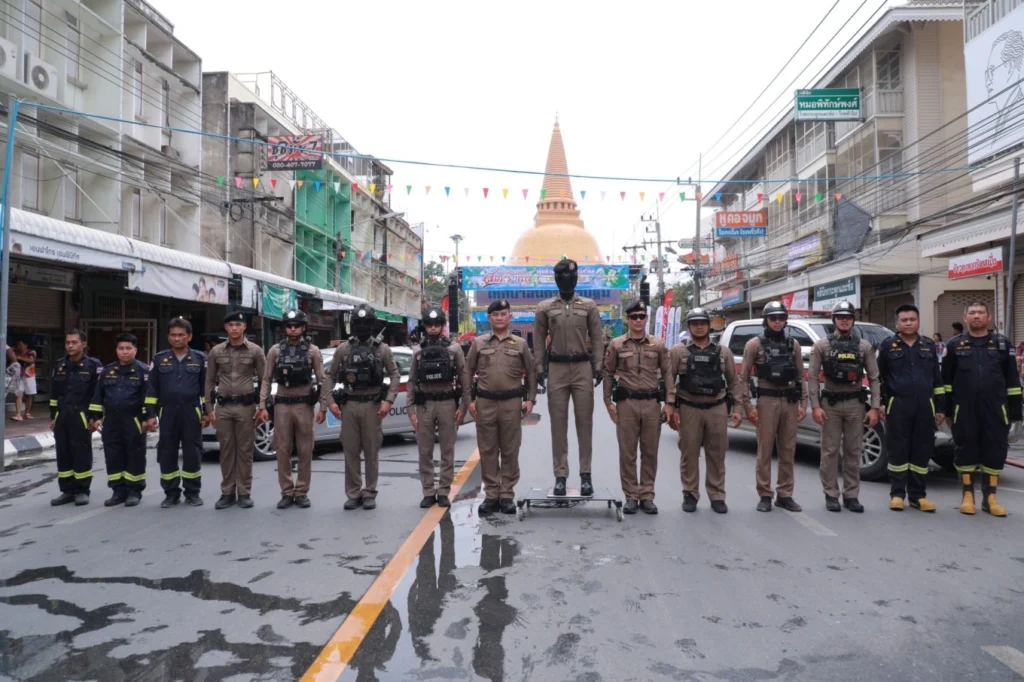
kbtech times | April 27, 2025
Thailand’s groundbreaking decision to deploy robot police onto its city streets has already stirred controversy at home. But beyond Thailand’s borders, a quieter ripple effect is beginning to take shape — and experts warn it could soon become a global phenomenon.
The question now is no longer whether robot policing will expand beyond Thailand. It’s how fast.
Other Nations Are Watching — and Waiting
Across Southeast Asia, governments are observing Thailand’s experiment with intense interest.
Countries like Vietnam, Malaysia, and Indonesia — all facing their own complex challenges with urban crowd control, rising crime rates, and political unrest — see robot policing as a potentially attractive shortcut to modernization.
Diplomatic insiders report that early-stage talks have already begun between Thai robotics firms and foreign government representatives eager to replicate the model if Thailand’s rollout proves successful.
For smaller nations with limited resources, adopting robotic law enforcement offers a tempting proposition: less reliance on human officers, fewer training costs, and a future-facing image on the world stage.
But critics argue that this enthusiasm dangerously underestimates the real-world risks and long-term societal costs of AI-based law enforcement.
The Risk of “Copy and Paste” Without Caution
Thailand’s situation is unique: a dense, rapidly urbanizing country with a history of political instability and uneven digital infrastructure. Yet early signs suggest that many neighboring governments are considering adopting similar robotic policing models without fully adapting them to their own social, political, and legal realities.
“There’s a real danger in the domino effect,” warns Anucha Sirisap, a researcher specializing in Southeast Asian governance and technology.
“Countries may blindly copy Thailand’s model without addressing fundamental questions about accountability, human rights, or public oversight.”
In short, a failure in Bangkok would not remain contained.
It could trigger a regional backlash against robotics, AI policing, and even broader public trust in government technology initiatives.
Beyond Southeast Asia: Global Implications Loom
The ripple effects aren’t limited to Southeast Asia.
Global technology firms based in the United States, China, and Europe are closely monitoring Thailand’s robot rollout, eager to market their own AI law enforcement solutions if the Thai experiment gains legitimacy.
In a world racing toward automation, many authoritarian regimes — and even some struggling democracies — may view robot policing not as a tool for public safety, but as a new mechanism of control.
Without strict international standards and ethical frameworks in place, human rights advocates warn that robot policing could easily become a means of suppressing dissent, profiling minorities, and widening the gap between citizens and their governments.
The stakes, in other words, are not confined to Bangkok’s streets. They are global.
Will Thailand Be a Blueprint — or a Cautionary Tale?
Ultimately, whether Thailand’s leap into robotic policing becomes a blueprint for others or a cautionary tale depends on how events unfold over the coming months.
A smooth, transparent, and ethical integration could position Thailand as a pioneer of responsible AI governance.
But if the deployment triggers civil rights abuses, public backlash, or technological failures, it could set the global conversation about AI law enforcement back by decades.
The world is watching.
And what happens next in Thailand could shape the future of policing everywhere.
🧩 Related Articles:
- Will Thai Robot Police Erode Basic Civil Liberties Faster Than We Think?
- Inside the Lobbying War: How Tech Giants Pushed Robot Cops Onto Thailand’s Streets
- Are Bangkok’s Streets Ready for Robot Police? Experts Say No
- Thailand’s Gamble: Robot Police Force Officially Sanctioned Amid Rising Public Outcry





cuqE MusgdlgZ HUsmMXv RtqKCgZ eAKl vIxRbH BSdsfzV